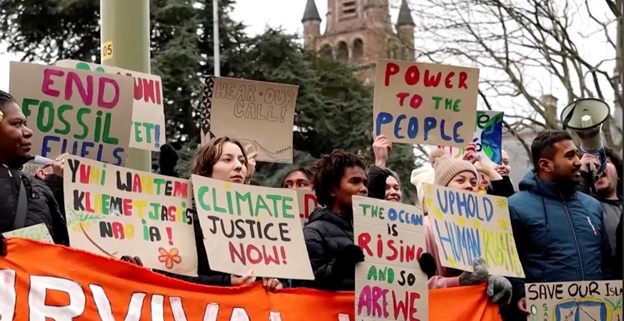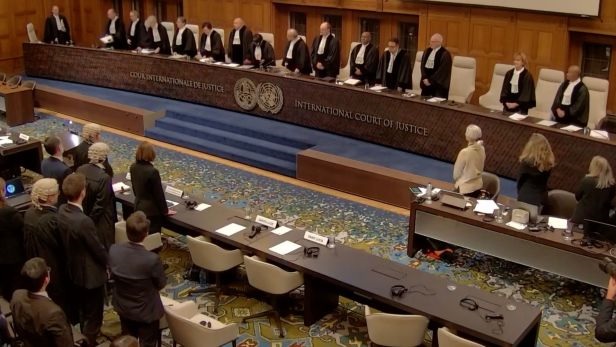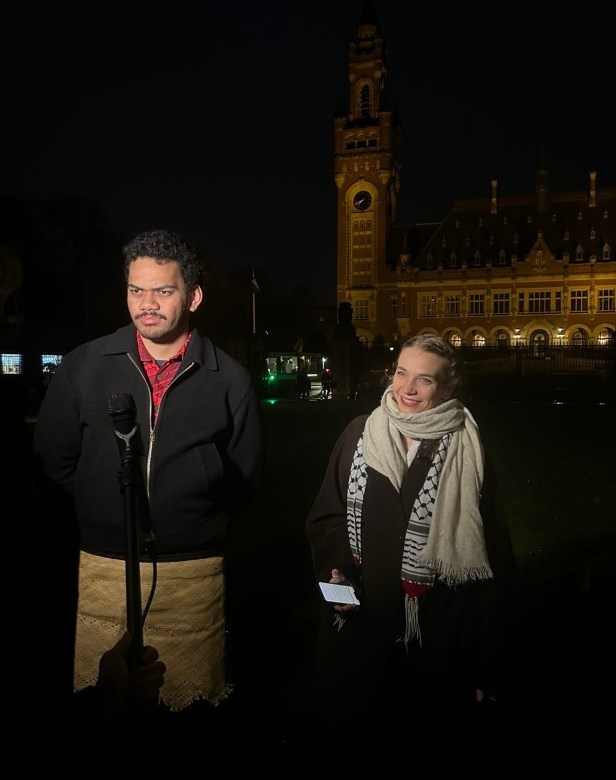
At the unprecedented climate change hearings at the Hague last month, prompted by a consensus Resolution of the UN General Assembly, developing countries, including Pakistan and India, joined hands to argue for climate justice. There is now cautious optimism that the forthcoming ICJ advisory will influence the obligations of states and set accountability standards
Putting Aside Petty Rivalries for the Larger Cause of Climate Justice
By Meena Menon
University of Leeds, UK

The year 2024, designated as the warmest year on record by the World Meteorological Organization, ended on a high note for climate justice after the unprecedented fortnight-long hearings held at the International Court of Justice at The Hague in December.
A global youth-led movement from the Pacific Island nations that began five years ago, particularly in Vanuatu and Fiji, had led to the United Nations General Assembly passing a consensus resolution in March 2023, seeking an advisory opinion on the obligation of states with regard to climate change.
Several Asian countries including India, Pakistan, Sri Lanka, Thailand, and Nepal, were among the 96 States and 11 international organizations that presented testimonies during the hearings, held December 2-13, 2024.

The International Court of Justice climate change advisory opinion hearing, December 2024 at The Hague, Netherlands - Screenshot
The court was tasked with addressing key questions related to the state's obligations, like states’ obligations under international law to protect the climate and environment from anthropogenic greenhouse gas emissions for current and future generations.
Legal consequences
What are the legal consequences for states whose acts and omissions caused significant harm to the climate system, particularly for small island developing states, that are vulnerable to the adverse effects of climate change, and for the peoples and individuals affected by its impacts?
The slow progress on the climate summits held annually by the Conference of Parties to the United Nations Framework Convention on Climate Change (UNFCCC) is what prompted the UNGA to move for an advisory opinion.
The latest COP in Baku in 2024 perhaps underlined the universal despair about the process and its deficient outcomes despite the Paris agreement in 2016 which aimed at restricting the global temperatures to below 1.5 degrees Celsius above pre-industrial levels.
During the hearings, developed countries, including the USA, held the position that climate justice cannot fall within the ambit of human rights and tried to restrict it to the framework of law of the UNFCCC and the Paris Agreement. However, most developing countries led by the Republic of Vanuatu countered this position, noting that several international laws were applicable.
Ralph Regenvanu, Special Envoy for Climate Change and Environment for The Republic of Vanuatu emphasized the need for an advisory. He said that some of the world’s largest greenhouse gas emitters such as Australia, the United States, Saudi Arabia, and China argued that their obligations are already set out in existing treaties. Regenvanu also pointed out that these treaties and commitments have regrettably failed to motivate substantial reductions in emissions. He added that Vanuatu and other states argued that the conduct responsible for climate change is unlawful under a range of international obligations, including those under the law of the sea, human rights law, and environmental law.
India too favored an advisory within the United Nations framework and the Paris Agreement and urged the Court to “avoid creating” new or additional obligations beyond what is already agreed upon under the climate change regime, which takes due consideration of climate justice and the principles of equity and “common but differentiated responsibilities and respective capabilities” (CBDR-RC), according to its written statement.
India’s contribution to climate change is historically less than 4%. Currently, its per capita greenhouse gas emissions are less than half the global average. One of the ways it’s tackling its emission problem is through the use of rooftop solar. In its written statement, India stressed the question of transboundary harm and the need to prevent it.
However, it also submitted that “environmental pollution and climate change must not be conflated” and “while there is an overlap in some areas, the science is clear on what the differences are in the two phenomena both at temporal and spatial scales”. India contends that, while addressing the questions, the Court, in the exercise of its judicial function, may consider that climate change issues cannot be treated as pollution of the environment. Therefore, climate change cannot be dealt with as transboundary harm to the environment but is dealt with under a distinct regime of UNFCCC and its two instruments.
Worst affected
On the other hand, Pakistan in its written statement said that it was among the ten most affected countries due to climate change. In 2022 flooding affected a third of the country and over 33 million people. It is disproportionately affected by climate change and contributes less than 1% of global greenhouse gas emissions.
Pakistan reiterated the obligation of states to prevent significant transboundary harm to the environment and favored the inclusion of international human rights and other laws, as existing commitments under the Paris Agreement and the UNFCCC framework are inadequate for this.
In its oral statement, Pakistan was among the large number of countries that contended that the Paris Agreement was not lex specialis which refers to the principle that more specialized law applies over general law, when the two conflict.
Pakistan called to apply the general principles of state responsibility within the context of climate change. It also stressed the need for compensation for climate harm and the obligation of prevention, enshrined in international law since the mid-19th century.
There is no excuse for polluting states now to argue that they were ignorant that their release of greenhouse gases into the atmosphere could potentially alter the climate system, or that such interference could have catastrophic effects for other states, argued Pakistan.
Calling out the position of some states, it referred to the obligation to prevent significant transboundary harm through the ravages of climate change caused by the activities of other states in their own territory. While a few states have argued that the obligation of prevention does not apply in the context of climate change, the UNFCCC recognizes that the obligation to prevent transboundary harm applies in the context of climate change. Therefore, Pakistan submitted that the position of the USA that the obligation of prevention cannot apply to pollution due to varied and diffuse activities over a long period of time is untenable.
Like Pakistan, Sri Lanka favored a broad interpretation of human rights and justice under international law with regard to climate change and not just the UN frameworks and agreements. It asked the Court to uphold the obligations of international human rights, the principles of prevention of harm, the transboundary obligation, and the duty of due diligence, and to hold states accountable for their actions and omissions.
Thailand also stated that climate treaties should be interpreted in light of pre-existing rules and treaties, including international human rights law.
Contending that it was paying for “bad karma” that “we did not create” Nepal emphasized the framework of human rights with regard to climate change and said the relevant legal framework comprises international treaties in the field of climate change such as UNFCCC and the Paris Agreement; international treaties regarding human rights and the rules of customary international law ⎯ particularly the duty of due diligence, principle of prevention of significant harm to the environment and duty to co-operate and assist. Nepal views that this obligation of due diligence applies equally in the context of climate change. It stated that the general obligation to prevent significant transboundary environmental harm is a well-established rule in international law.

Siosiua Veikune, Campaigner, Pacific Island Students Fighting Climate Change, and Jule Schnakenberg, Interim Executive Officer, World Youth for Climate Justice press statements in front of The Hague, December 2024
Climate justice campaigners are optimistic that the ICJ advisory will influence the obligations of states and set accountability standards, especially after the positive outcome in the case of the Chagos Islanders, when the UK decided to return the islands back to Mauritius in October 2024. It can take more than a year to issue an advisory but the ICJ is expected to announce its ruling sometime in 2025.
(Meena Menon is an independent journalist and author and currently Visiting postdoctoral fellow at the Leeds Arts and Humanities Research Institute (LAHRI), University of Leeds, UK)
This is a Sapan News syndicated feature.

